Did you ever receive unpleasant remarks from people while you were mourning the death of your pet or penfriend? Did you notice people saying things like “common it’s nothing to feel said….you didn’t lose a child or family member” Did that make you feel even worse than before? If yes, then my friend you are experiencing disenfranchised grief!
What is Disenfranchised Grief?
When you lose something or someone close to your heart, grief is inevitable. The emotional experience is natural and can look different for everyone. The grieving process varies from person to person. Grief encompasses more than intense sadness after the death of a child or a family member. When society doesn’t validate your own grief, it is known as disenfranchised grief.
Disenfranchised grief is the term first coined by Dr. Kenneth Doka in the 1980s. The grief and loss expert defined the term in his book Disenfranchised grief: recognizing hidden sorrow as “the grief that persons experience when they incur a loss that is not or cannot be openly acknowledged, publicly mourned, or socially supported.”
In short, it means your grief doesn’t fit the larger society’s norms, rules, and rituals dealing with death and loss. So, people do not acknowledge or validate your grief and barely support you that in turn prolongs your emotional pain and intensifies the grieving process. You can say that the griever’s “right to grieve” is denied.
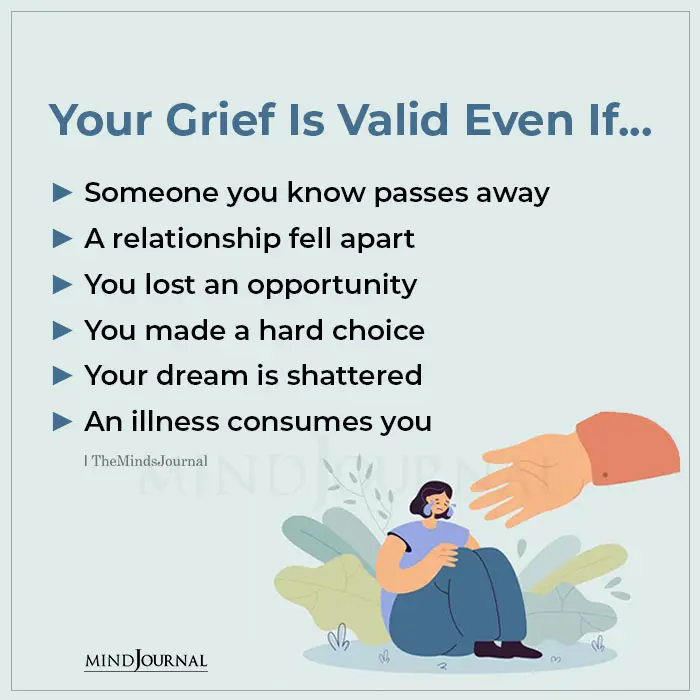
Also read Top 5 Regrets Of The Dying And How We Can Avoid Them
Causes of Disenfranchised Grief
Disenfranchised grief stems from different types of losses and below are broad categories:
1. Stigmatized loss
Losses that surround stigma include –
- Death by suicide
- Stillbirth
- Miscarriage
- Infertility
- Death due to drug overdose or some sort of addiction
- Estrangement with a loved one suffering from severe mental health problems.
Taboo causes of death! People will not support or openly acknowledge the grief that stems from such losses. Instead, they may judge or criticize you, which leaves you to grieve alone. There are complex cases where the griever too invalidates their own grief – for instance, grief after an abortion – because it is the consequence of their decisions.
2. Unrecognized relationships
Your grief is disenfranchised if your relationship does not attain the same recognition or importance as compared to other relationships. Also when you keep your relationship private, it’s hard for you to mourn publicly when your partner dies. Some examples of unrecognised relationships are:
- LGBTQ+ people
- Open or non-monogamous relationships
- Friends with benefits and no one of your involvement
- Ex-partner or someone you were dating
- Death of an unknown sibling or absent parent
- Death of an online friend or pen pal
Also read The Fundamental Differences between Sadness and Depression
3. Insignificant loss
Losses that are deemed insignificant by others or considered insignificant in comparison to other people’s losses include-
- Relationship breakups or estrangement
- Loss of mobility
- Loss of possessions or favourite childhood dress or toy
- Dementia or Alzheimer’s disease
- Loss of freedom, safety, independence
- Death of pet
- Adoption that doesn’t go through
- Death of mentor, teacher, patient, therapy client, friend’s child or coworker
4. Non-death losses
Death is considered a major type of loss in every culture. But a loss that is not due to death can also impact your mind severely and grief may be disenfranchised due to a lack of acknowledgement, support and few outlets for expressing yourself. Some of the non-death losses also include those considered as insignificant losses –
- End of relationships like divorce
- Breakups with friends
- Loss of job
- Infertility
- Loss of your home country
- Estrangement from family members.
Also read Being Crazy in a Sick Society is Actually Healthy
5. Grief that doesn’t align with social norms
Society has set its own rules about grief and how people should or shouldn’t mourn their losses. Society’s expectation of grief is influenced by mass media, film, magazines, and some influencers. People may expect you to
- Visually show sadness by crying or in other ways
- lose your appetite
- sleep a lot
- Avoid social events
- Your boss may expect you to be productive even if you have recently experienced a loss
- Some of your friends may expect you to get over a break up just in few weeks
People may seem confused if your expression of grief doesn’t match up to their expectations. They may even accuse you of not mourning your loss. Other ways of showing grief that is less validated by society are –
- Lack of emotion
- Anger
- Increased busyness like working long hours
- Alcohol or substance abuse to cope
6. Exclusion from mourning
Some people think you have less right to mourn if you have lost a best friend or classmate or ex or your supercool neighbour – even when you had a meaningful relationship with them. It could be because they are not a part of the immediate family.
Weird, isn’t it? But that’s the reality! Guess what? There exists an assumption that certain groups lack the capacity to grieve, including
- children
- people with poor or loss of cognitive function
- people with serious mental health conditions
- people with developmental disabilities
This group of people often experience disenfranchised grief. Their grieving process is not supported or acknowledged and are not even allowed to participate in public mourning rituals.
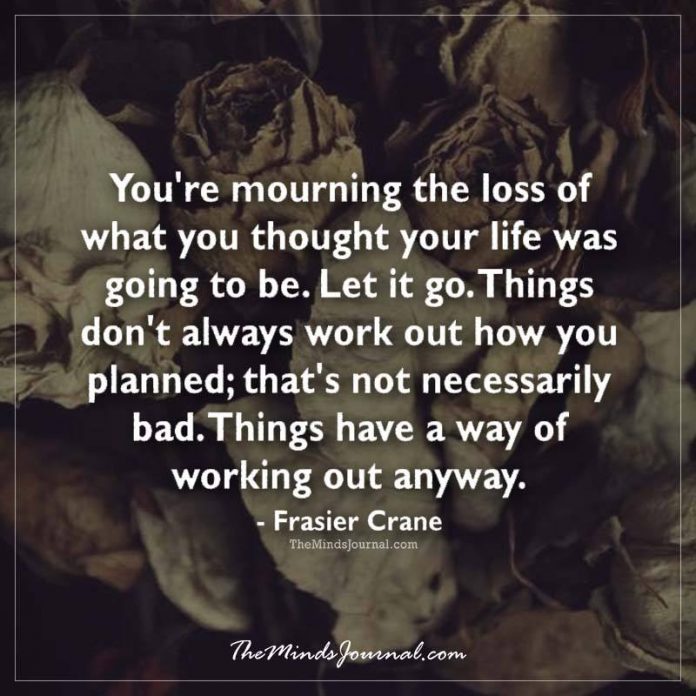
Examples of Disenfranchised Grief
- Death of ex-partner
- Death of abuser
- Dementia of a loved one
- Addiction of a loved one
- Death of a patient
- Death of a pet
- Breakup or divorce
- Infertility
- Abortion
- Losing a job
- Moving to a new community
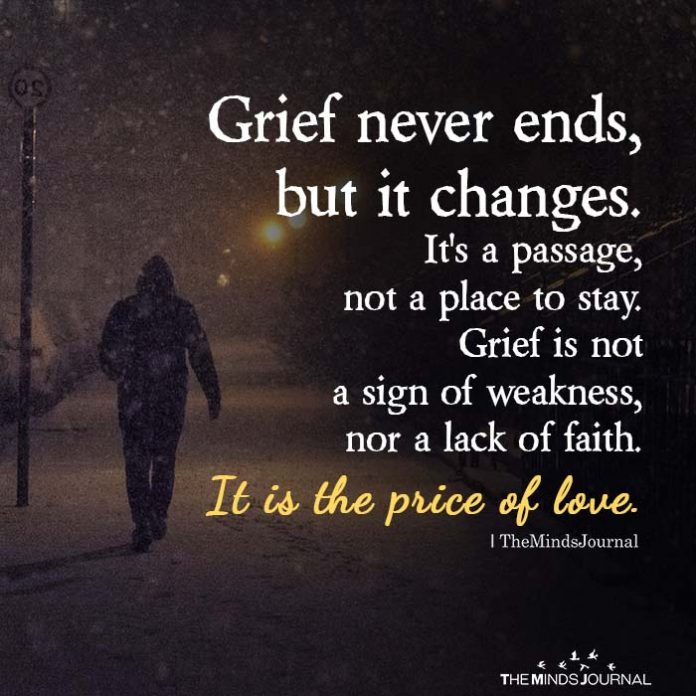
Symptoms of Disenfranchised Grief
People experience grief at physical, mental, emotional, and spiritual levels. Every individual has a unique way of dealing with grief and needs a certain amount of time. Symptoms of disenfranchised grief are:
- Anger, fear, and guilt
- Sadness, despair, and loneliness
- Trouble making decisions
- Feeling numb or nothing at all
- Difficulty concentrating or remembering things
- Change in sleep patterns
- Unexplained physical pain and muscle tension
- Change in appetite
- A sense of shock or disbelief
The above symptoms are similar to symptoms of grief. Other symptoms of disenfranchised grief are:
- An intensified version of the above-listed symptoms
- The loss happened at least six months ago
- Feeling lack of closure
- Feeling worthless
- Sense of isolation
- Feeling stigmatized either by society or by yourself
- Feeling guilt or shame for your loss and current situation
- Difficulty connecting with people and maintaining relationships
6 tips to cope up with disenfranchised grief
1. Acknowledge the loss for yourself
No one can feel your loss the way you do it. So, even if there is no one to acknowledge, support or validate your grief, acknowledge and validate it yourself. Say out loud what you have lost or write it down somewhere and you will surely notice a change.
Also read 4 Ways To Get Emotional Closure In A Relationship, All By Yourself
2. Feel all your feelings
People with disenfranchised grief experience intense emotions because of their loss and unpleasant responses of people to their experience. You may have conflicting feelings besides sadness, anger, hopelessness, and a range of other emotions. It’s important to feel all your feelings. Remember that every feeling you have is valid and you have the right to express them in whichever way you want.
3. Engage in creative work
You can start doodling, painting, origami or journaling or composing songs or poems that will help you relieve stress. There are plenty of studies validating the use of art to channel grief for healing. Journalling is my personal favourite method to cope up with a loss of any kind. It mitigates both physical and psychological issues including symptoms of depression and trauma disorder.
4. Engage in self-care
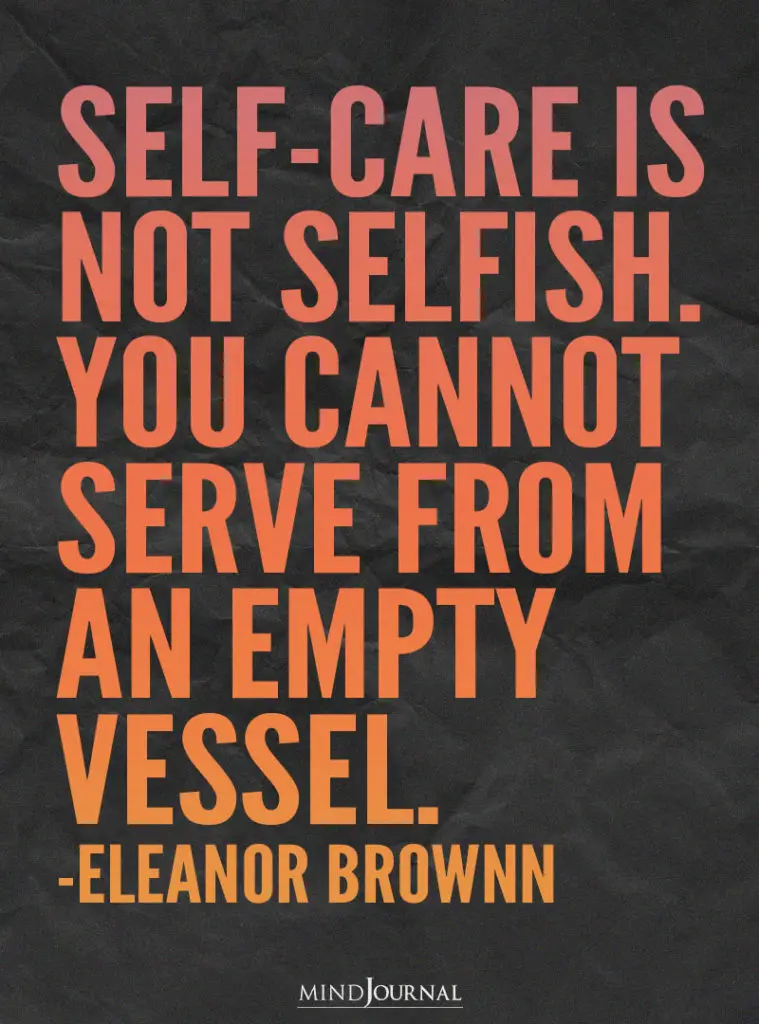
Disenfranchised grief affects sleep, appetite, physical health that is manifested as pain in specific body parts and mental health that is manifested as anxiety or depression. So, you need to take care of your body. You can start with:
- Brisk walk
- Eat nourishing foods
- Read, listen or watch stuff about your kind of stuff to cope with isolation
- Drink plenty of water – 3.7 litres for men and 2.7 litres for women as recommended by The U.S. National Academies of Sciences, Engineering, and Medicine. You can adjust the quantity depending on factors like temperature in your city, pregnancy, and overall health.
Simple tips to boost your mental health care when you are experiencing disenfranchised grief:
- Practise gratitude
- Get a furry friend
- Try something out of your comfort zone
- Meditation for 5 minutes a day for starters
- Yoga and breathing exercises
You can also create rituals like –
- Lighting candles or planting a tree in honour of your loss.
- Visting meaningful places associated with your loss.
- Holding memorial in a place that holds significance.
- Writing goodbye letter
Also read What To Do If You Are Depressed: A 15-Step Guide
5. Talk to a therapist
Sometimes grief doesn’t improve on its own and leaving it unaddressed can take a toll on your mental health or push you to think of suicide or self-harm.
Consulting a grief counsellor or therapist who specializes in grief recovery can validate your experience and offer the right kind of support. Seeking therapy can help you acknowledge your loss, understand your feelings, navigate your thoughts and move forward in peace. Therapists help you realise it’s ok to mourn and offer a safe, judgement-free space to express grief. Also, provide resources on peer or community or self-help support.
If you are experiencing disenfranchised grief due to perinatal loss or loss of a job affecting your romantic relationship, you may see a couple therapist. This will help you strengthen your bond with your partner and gain the ability to support one another.
If you are not sure that you need professional help then check out – 11 signs you need to talk to a therapist.
6. Get in touch with a support network
Your first line of support includes family members, close friends and other trusted ones who can understand your emotional pain and validate your feelings. They are the ones who can take care of you by cooking your favourite meals or organising trips for you or motivate you to see the brighter side of life. Sometimes loved ones too can be critical of your grief if they considered your loss to be insignificant.
If you are not getting the kind of support you are looking for you can reach out for help from support groups and organizations that are available 24/7. Some of them are listed below:
- American Veterinary Medical Association – offers grief treatment resources for animal care workers
- The National Alliance for Mental Illness – Offers grief support for healthcare workers
- SAMHSA’s National Helpline – provides referrals to mental health professionals, support groups, and other community resources that may help you cope up with grief.
- Missing Grace offers grief support to parents who have lost children to miscarriage or stillbirth
- COPE Foundation offers grief support to families who have lost children as well as provides referrals to in-person support groups in your area.
The bottom line
Grief is inevitable whether the loss is small or big. Grief is valid whether you are mourning the death of a loved one or pet or penfriend or sad just because you lost a gift that you received on your fifth birthday. But, sometimes society makes it hard for you to express your sadness because your loss surrounds stigma, taboo or something the society perceives as insignificant or fails to recognise. Grieving is your right. Never suppress it or else your physical and mental health will go for a toss. Follow the coping tips, express yourself safely, take the help of trusted ones in your circle. Never hesitate to ask what you need!
Please share this article with anyone who you may think will find it valuable and helpful.
References
Corr, C.A., 1999. Enhancing the concept of disenfranchised grief. OMEGA-Journal of Death and Dying, 38(1), pp.1-20. Devine, M., 2017. It's Ok that You're Not Ok: Meeting Grief and Loss in a Culture that Doesn't Understand. Sounds True. Tsui, E.K., Franzosa, E., Cribbs, K.A. and Baron, S., 2019. Home care workers’ experiences of client death and disenfranchised grief. Qualitative health research, 29(3), pp.382-392. Mortell, S., 2015. Assisting clients with disenfranchised grief: The role of a mental health nurse. Journal of Psychosocial Nursing & Mental Health Services, 53(4), p.52.
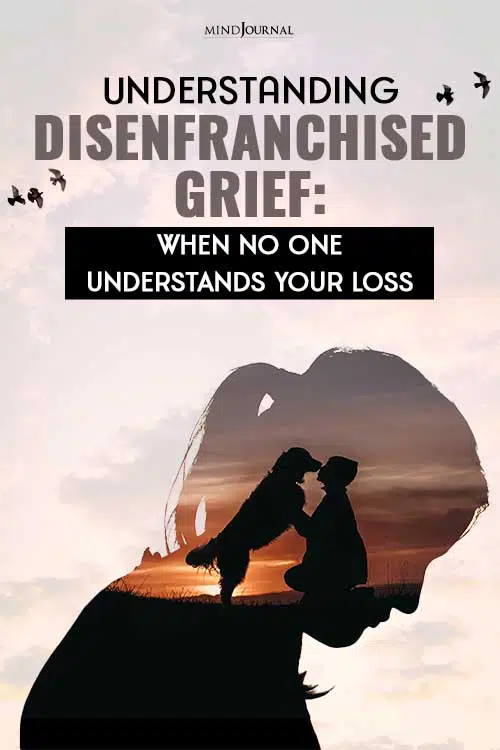
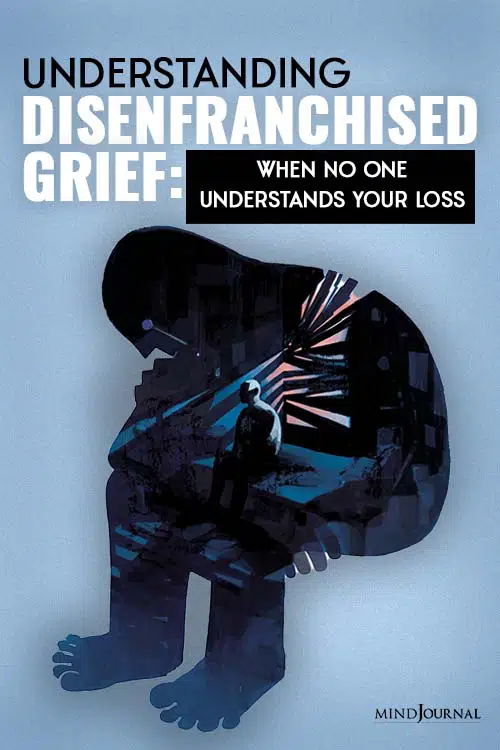
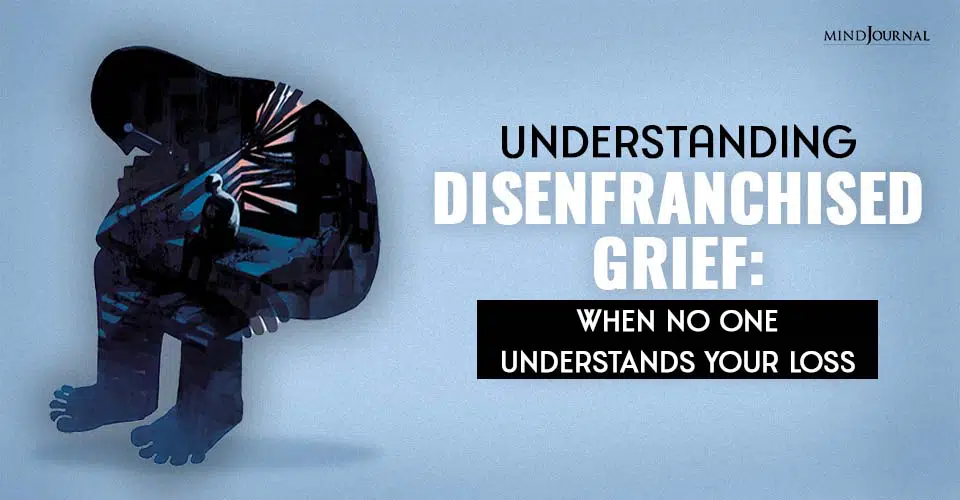







Leave a Reply
You must be logged in to post a comment.